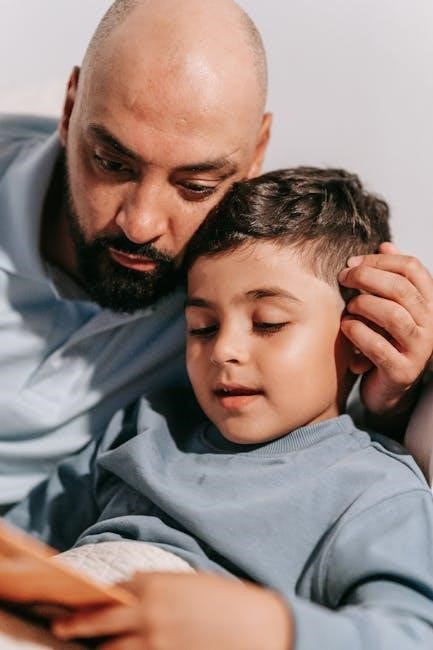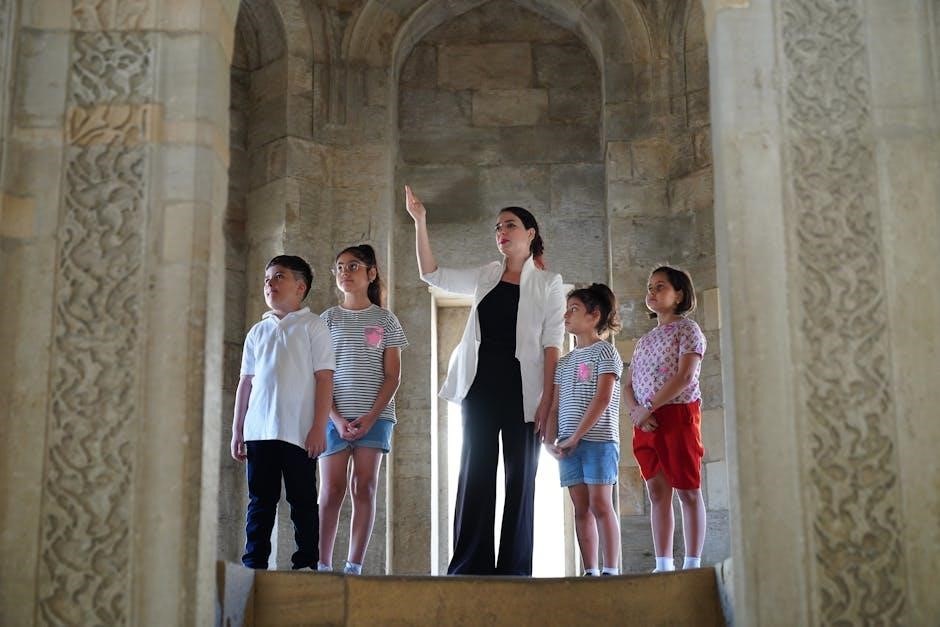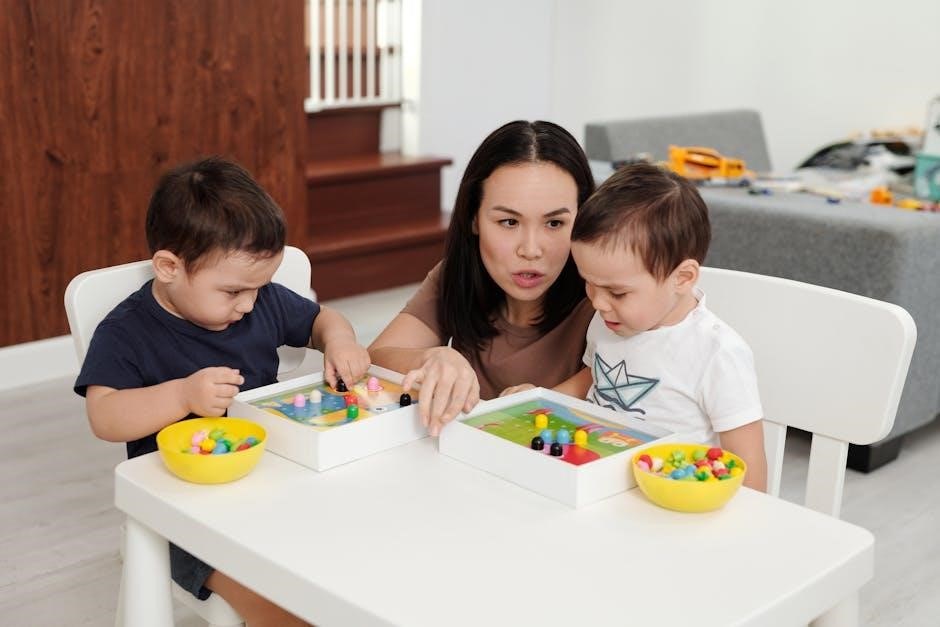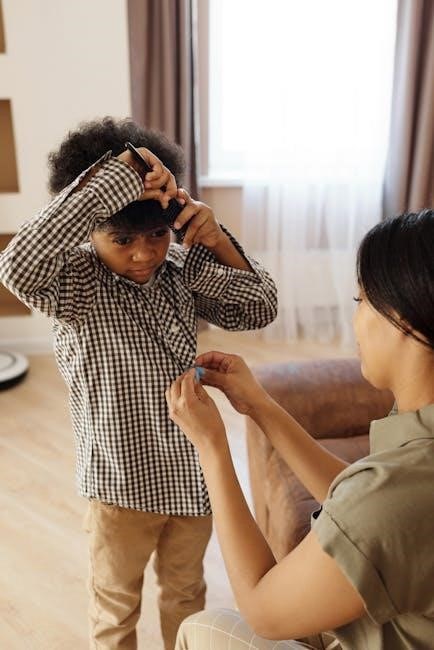Explore a heartfelt journey guiding high school students through life’s challenges, fostering meaningful connections, and nurturing personal growth in this engaging and insightful experience․
Understanding the Basics of Love and Relationships
Love and relationships are built on trust, communication, and mutual respect․ Trust forms the foundation, allowing partners to feel secure and supported․ Effective communication ensures emotional needs are met, fostering intimacy and understanding․ Respect involves valuing each other’s boundaries and individuality․ Emotional connections deepen as shared experiences and vulnerability create lasting bonds․ While romantic comedies often idealize love, real relationships require effort and patience․ Psychologists study these dynamics, emphasizing how media influences perceptions․ Balancing realistic expectations with emotional investment helps navigate the complexities of love, leading to fulfilling and enduring partnerships․
Why Learning About Love is Essential for Personal Growth
Learning about love is crucial for personal growth as it fosters self-awareness, empathy, and resilience․ Understanding love helps individuals recognize their needs, boundaries, and emotional patterns․ Through relationships, people develop emotional intelligence, learning to navigate conflicts and build meaningful connections․ Love teaches vulnerability, trust, and compromise, which are vital for self-improvement․ It also encourages self-reflection, helping individuals grow emotionally and mentally․ By embracing love’s challenges and joys, people gain a deeper understanding of themselves and others, leading to a more fulfilling and purposeful life․ This journey of learning love becomes a cornerstone of personal development and lasting happiness․

Understanding Love
Love is a complex, multifaceted emotion that shapes human connections, fostering intimacy, care, and mutual growth, while navigating its various forms and profound impact on lives․
The Different Types of Love
Love manifests in various forms, each enriching human connections in unique ways․ Romantic love often centers on passion and intimacy, while platonic love emphasizes deep, non-romantic bonds․ Self-love, a foundation for healthy relationships, fosters personal growth and self-respect․ Familial love, rooted in blood ties and shared experiences, offers unconditional support and belonging․ Psychologists and romantic comedies often explore these dynamics, highlighting how love evolves and shapes our identities․ Understanding these types helps navigate relationships effectively, whether fostering intimacy, maintaining friendships, or nurturing self-care․ Balancing these forms of love creates a harmonious, fulfilling emotional life․
Signs of True Love and How to Recognize Them
True love is often marked by trust, respect, and unwavering commitment․ Partners in a loving relationship prioritize each other’s well-being, showing empathy and understanding․ They celebrate each other’s successes and support each other through challenges․ Open communication, honesty, and vulnerability are key indicators, as they foster a deep emotional connection․ True love also involves compromise and mutual growth, where both individuals feel valued and accepted for who they are․ When both partners consistently show up for one another, it reflects a genuine and enduring bond, distinguishing it from fleeting infatuation or superficial attraction․
How Love Evolves Over Time
Love undergoes significant transformations as relationships progress․ Initially, it may be driven by passion and excitement, often fueled by dopamine and novelty․ Over time, this intense attraction evolves into a deeper emotional bond, rooted in trust, mutual respect, and shared experiences․ As partners grow together, they learn to navigate life’s challenges, fostering resilience and understanding․ Love becomes more unconditional, embracing each other’s flaws and strengths․ Through shared milestones and adaptation to life’s changes, love matures into a stable, enduring connection․ This evolution requires commitment, patience, and a willingness to grow together, creating a lasting and fulfilling partnership․

Communication in Relationships
Communication is the cornerstone of strong relationships, fostering trust, understanding, and connection․ Effective dialogue, both verbal and non-verbal, ensures emotional harmony and intimacy in any partnership․
The Importance of Active Listening
Active listening is a vital skill in relationships, building trust and intimacy by showing genuine interest in your partner’s thoughts and feelings․ It involves fully engaging with the speaker, maintaining eye contact, and avoiding interruptions․ This practice fosters emotional connection, reduces misunderstandings, and strengthens communication․ By truly hearing your partner, you validate their emotions and create a safe space for open dialogue․ Active listening is not just about hearing words but understanding the underlying message, which is key to resolving conflicts and deepening your bond․ It cultivates empathy and mutual respect, essential for a healthy and fulfilling relationship․
How to Express Your Feelings Effectively
Expressing your feelings effectively is crucial for fostering understanding and connection in relationships․ Start by being clear and direct, using “I” statements to convey emotions without blaming your partner․ For example, say, “I feel hurt when․․․” instead of “You always․․․”․ Be specific about your feelings and avoid generalizations․ Choose the right time to talk when both of you are calm․ Practice vulnerability by sharing your thoughts openly, even if it feels uncomfortable․ Use non-verbal cues like body language and tone of voice to reinforce your message․ The goal is to communicate your emotions honestly while fostering empathy and mutual understanding․
Conflict Resolution Strategies
Effective conflict resolution strengthens relationships by fostering understanding and respect․ Stay calm and address issues promptly to prevent escalation․ Practice active listening by focusing on your partner’s perspective without interrupting․ Use “I” statements to express feelings without blame, such as “I feel concerned when․․․” instead of “You always․․․”․ Seek solutions together by compromising and finding mutually beneficial outcomes․ Avoid bringing up past grievances and focus on the present issue․ End the conversation on a positive note, reaffirming your commitment to the relationship․ Conflict can grow intimacy when handled with empathy and teamwork․

Building Intimacy
Intimacy fosters emotional connection, trust, and vulnerability, strengthening relationships through shared experiences and mutual understanding, creating a deeper bond between partners․
The Role of Emotional Intimacy
Emotional intimacy is the foundation of deep connections, fostering trust, vulnerability, and understanding․ It involves openly sharing thoughts, feelings, and desires, creating a safe space for mutual support․ Active listening, empathy, and validation are key components, allowing partners to feel seen and valued․ Emotional intimacy strengthens bonds, enhances communication, and builds resilience against conflicts․ It encourages personal growth and promotes a sense of belonging, making relationships more fulfilling and meaningful․ Cultivating emotional intimacy requires effort, patience, and dedication, but it is essential for fostering lasting, healthy connections․
Physical Intimacy and Its Significance
Physical intimacy is a vital aspect of relationships, encompassing touch, affection, and closeness․ It fosters emotional bonds by releasing oxytocin, often called the “love hormone,” which strengthens connection and trust․ Regular physical intimacy can reduce stress, promote relaxation, and create a sense of safety․ However, preferences vary, so open communication is essential to ensure both partners feel comfortable and respected․ While physical intimacy is important, it complements emotional and intellectual connections, contributing to a balanced and fulfilling relationship․
Intellectual Intimacy: Connecting on a Deeper Level
Intellectual intimacy involves sharing thoughts, ideas, and beliefs, fostering a deep mental connection․ It strengthens relationships by encouraging open dialogue and mutual understanding․ Engaging in meaningful conversations about values, goals, and passions creates trust and emotional closeness․ This connection allows partners to challenge each other’s perspectives, promoting personal growth․ Intellectual intimacy is cultivated through shared activities like reading, debating, or solving problems together․ It enhances emotional bonds and builds a foundation for long-term connection, ensuring relationships remain stimulating and fulfilling on multiple levels․

Overcoming Heartbreak
Heartbreak can be devastating, but it offers opportunities for growth and self-discovery․ Healing involves acknowledging pain, reflecting on lessons learned, and embracing change to move forward stronger․
Understanding the Stages of Grief
Heartbreak often triggers a grieving process, which includes denial, anger, bargaining, depression, and acceptance․ These stages help individuals process loss and emotions․ Denial acts as a shield, while anger surfaces as frustration․ Bargaining may involve seeking reconciliation, followed by depression, which is a natural reaction to pain․ Acceptance marks the beginning of healing․ Everyone experiences these stages differently, and understanding them can provide comfort and clarity during difficult times․ Recognizing these phases is crucial for moving forward and fostering personal growth after a breakup․
How to Move On After a Breakup
Moving on after a breakup requires self-care, reflection, and boundaries․ Allow yourself to grieve but avoid dwelling on negativity․ Engage in activities that bring joy and distract your mind․ Setting boundaries, like limiting contact with your ex, can help you heal․ Redirect your energy into hobbies, friendships, or personal goals․ Reflect on the relationship to gain insights but avoid blaming yourself․ Let go of the need for closure and focus on rebuilding your sense of self․ Time and patience are key to healing and embracing new opportunities for love and growth․
Rebuilding Self-Worth After Heartbreak
Rebuilding self-worth after heartbreak involves focusing on self-care and self-compassion․ Engage in activities that boost confidence, such as exercise, hobbies, or creative pursuits․ Practice self-reflection to identify your strengths and what you deserve in a relationship․ Surround yourself with supportive friends and family who remind you of your value․ Set boundaries to protect your emotional well-being and avoid self-blame․ Celebrate small achievements to rebuild your identity and independence․ Over time, this process helps you regain confidence and develop a healthier perspective on love and relationships․

Lessons from Romantic Comedies
Romantic comedies teach us about love, chemistry, and communication․ They highlight the importance of vulnerability, trust, and shared humor in relationships, blending realistic and unrealistic portrayals․
What Romantic Comedies Teach Us About Love
Romantic comedies often illustrate the power of emotional connection, vulnerability, and understanding in relationships․ They show how love requires effort, compromise, and open communication․ These films highlight the importance of shared values, humor, and resilience in overcoming challenges․ While they may idealize love, they also remind us that genuine relationships thrive on authenticity and mutual respect․ By portraying relatable scenarios, romantic comedies offer insights into navigating love’s complexities, emphasizing that true connection goes beyond surface-level attraction․
Unrealistic Expectations vs․ Real-Life Relationships
Romantic comedies often create idealized portrayals of love, fostering unrealistic expectations about relationships․ While films depict perfect chemistry, instant connections, and flawless partners, real-life relationships involve imperfections, misunderstandings, and growth․ Real relationships require effort, patience, and communication to navigate challenges․ Unlike movies, true love isn’t always neatly wrapped up with a happy ending; it evolves through shared experiences and mutual commitment․ Recognizing this difference helps set realistic expectations, fostering healthier and more satisfying partnerships built on authenticity rather than fantasy․
Key Takeaways from Popular Romantic Comedies
While romantic comedies often blend humor with heartfelt moments, they also offer valuable lessons about love․ Many films emphasize the importance of vulnerability, self-discovery, and communication in relationships․ They highlight the value of embracing imperfections and taking risks for love․ Additionally, these movies often stress the significance of shared values and genuine connection over superficial attraction․ By balancing entertainment with meaningful themes, romantic comedies provide insights into the complexities of love, encouraging viewers to reflect on their own relationships and aspirations for partnership․

Love and Personal Growth
Love fosters personal growth by inspiring self-improvement, empathy, and resilience, helping individuals evolve emotionally and intellectually through shared experiences and challenges, leading to a fuller life․
How Love Shapes Your Personality
Love profoundly influences personality development by nurturing empathy, patience, and self-awareness․ It challenges individuals to grow beyond their comfort zones, fostering resilience and adaptability․ Through shared experiences, love encourages vulnerability, which strengthens emotional depth and understanding․ Positive relationships often enhance optimism and confidence, while difficult ones may cultivate humility and self-reflection․ Over time, love shapes values, priorities, and communication styles, leading to a more compassionate and well-rounded individual․ This transformation is a natural part of connecting deeply with others, making love a powerful catalyst for personal evolution and emotional maturity․
Learning Self-Reflection Through Relationships
Relationships serve as a mirror, reflecting our strengths, weaknesses, and areas for growth; Through interactions with partners, we gain insights into our emotions, behaviors, and communication styles․ Love and conflicts alike prompt self-examination, helping us identify patterns and habits that may hinder connection․ Feedback from loved ones encourages introspection, fostering self-awareness and emotional intelligence․ This process of self-reflection allows us to address insecurities, develop empathy, and align our actions with our values․ Ultimately, relationships become a catalyst for personal growth, teaching us to understand ourselves more deeply and embrace our authentic selves․
Embracing Change and Growth in Love
Love is a dynamic journey that requires adaptability and openness to change․ Relationships evolve as individuals grow, and embracing this transformation fosters deeper connections․ Change can stem from personal development, shifting priorities, or life circumstances, but it often strengthens bonds when approached with resilience․ Navigating transitions together, such as career moves or life milestones, encourages mutual support and understanding․ By embracing growth, couples can redefine their relationship, ensuring it remains vibrant and fulfilling․ Love thrives when both partners evolve individually and together, creating a partnership that adapts to life’s challenges and celebrates shared progress․

Maintaining Healthy Relationships
Maintaining healthy relationships requires mutual respect, effective communication, and trust․ Balancing independence with togetherness fosters a strong, enduring partnership․
The Importance of Trust and Loyalty
Trust and loyalty are the bedrock of any thriving relationship․ Trust ensures reliability and security, fostering an environment where both partners feel safe to express themselves․ Loyalty, on the other hand, reinforces commitment, demonstrating dedication through shared challenges․ When both elements are present, they create a resilient foundation, allowing relationships to endure life’s ups and downs․ Without trust and loyalty, misunderstandings and insecurities can arise, weakening the bond․ Nurturing these qualities helps build a partnership rooted in mutual respect and unwavering support, essential for long-term happiness and fulfillment․
Setting Boundaries in a Relationship
Setting boundaries is vital for healthy relationships, defining what is acceptable and protecting emotional well-being․ They prevent conflicts by clarifying expectations and respecting personal space․ Boundaries aren’t about controlling others but honoring one’s needs and desires․ Open communication and mutual understanding are essential to establish these limits, ensuring both partners feel comfortable and valued․ By setting clear boundaries, relationships can thrive, avoiding misunderstandings and fostering trust and respect․ This balance supports a harmonious and respectful partnership․
Shared Goals and Values in Partnerships
Shared goals and values are the foundation of a harmonious partnership, ensuring both individuals work toward common objectives․ Aligning on life priorities, such as family, career, or personal growth, fosters unity and purpose․ Mutual values like honesty, respect, and loyalty create trust and stability․ When partners share these elements, decision-making becomes easier, and conflicts are resolved more effectively․ Regularly discussing and reaffirming these shared aspects strengthens the bond, promoting a deeper connection and long-term satisfaction in the relationship․

Love in the Digital Age
Love in the digital age is shaped by technology, with dating apps and social media transforming how people connect․ Relationships now often begin and evolve online․
The Role of Dating Apps in Modern Love
Dating apps have revolutionized modern love by providing unprecedented access to potential partners․ They offer convenience and a vast pool of options, allowing users to connect quickly․ However, this ease can sometimes lead to superficial connections based on profiles rather than deeper compatibility․ To make the most of dating apps, it’s essential to balance quantity with quality and maintain authenticity․ By being genuine and clear about what you’re seeking, you can navigate the digital dating world more effectively․ Additionally, with so many apps available, it’s crucial to choose platforms that align with your relationship goals and preferences to foster meaningful connections․
Navigating Digital Communication in Relationships
Digital communication has become a cornerstone of modern relationships, offering convenience but also presenting challenges․ Misunderstandings can arise from tone being lost in text, making clear and thoughtful messaging crucial․ Balancing digital interactions with quality time is key to maintaining intimacy․ Setting boundaries, like designating device-free moments, fosters healthier connections․ Scheduling regular video calls can help sustain emotional closeness in long-distance relationships․ While digital tools enhance accessibility, they shouldn’t replace meaningful, face-to-face interactions․ Striking this balance ensures relationships remain authentic and fulfilling in a tech-driven world․
How Social Media Impacts Relationships
Social media significantly influences modern relationships, often blurring the lines between reality and curated images․ While it can foster connection by allowing couples to share moments and stay updated, it also risks fostering comparison and insecurity․ Seeing idealized relationship highlights may lead to unrealistic expectations or feelings of inadequacy․ Additionally, excessive social media use can distract from genuine interactions, potentially straining intimacy․ Trust issues may arise from online interactions with others, highlighting the need for open communication and boundaries․ Balancing social media use with real-life connection is essential for maintaining healthy, authentic relationships in the digital age․

Future of Love and Relationships
The future of love and relationships may involve virtual reality dates, AI matchmakers, and technology blending with deeper human connections, reflecting evolving societal norms and embracing diversity․
Emerging Trends in Romantic Relationships
Modern romantic relationships are embracing non-traditional structures, such as polyamory and open relationships, as societal norms evolve․ Sustainability in relationships is gaining focus, with couples prioritizing mental health and shared growth․ The rise of “slow dating” encourages meaningful connections over fleeting encounters, while technology continues to redefine how people meet and interact․ Additionally, there is a growing emphasis on emotional intelligence and vulnerability as key components of healthy partnerships․ These trends reflect a shift toward more authentic, flexible, and fulfilling romantic connections in today’s fast-changing world․
The Impact of Technology on Future Relationships
Technology is reshaping the landscape of future relationships, offering both opportunities and challenges․ Dating apps and virtual platforms are transforming how people connect, with AI-driven matchmaking becoming more prevalent․ Virtual reality (VR) and augmented reality (AR) are expected to enhance intimacy in long-distance relationships․ However, over-reliance on digital tools may reduce face-to-face interaction, potentially weakening emotional bonds․ Privacy concerns and data security also pose risks․ Balancing technology’s benefits with genuine human connection will be crucial for fostering meaningful relationships in the digital era․
Redefining Love in Modern Society
Modern society is redefining love, embracing diversity and inclusivity․ Non-traditional relationships, such as polyamory and platonic partnerships, are gaining acceptance․ Love is now seen as a personal choice rather than a societal expectation․ The digital age has also shifted perceptions, with online connections blurring the lines between physical and emotional intimacy․ As individuals prioritize self-discovery, love is increasingly viewed as a journey of mutual growth and fulfillment․ This evolution reflects a broader cultural shift toward valuing authenticity and fluidity in defining what love means to each person․
